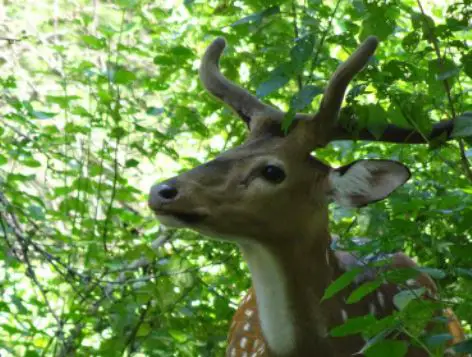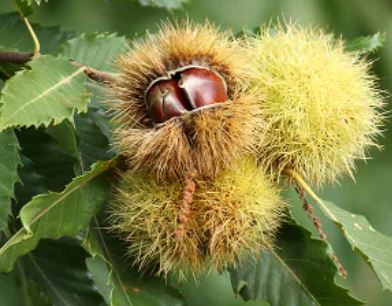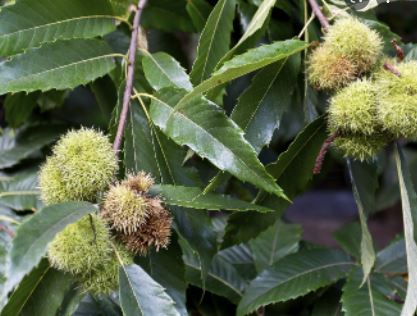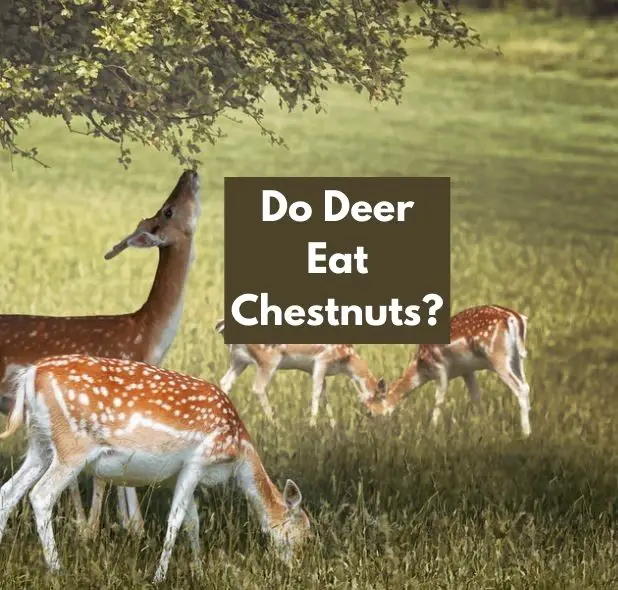There are a lot of myths out there about what deer do and do not eat. One common question is: do deer eat chestnuts?
Deer love to eat chestnuts because of their taste and easy access. While chestnuts are not a common part of a deer’s diet, they provide vitamins and protein which aid in deer health.
There’s a bit more to learn about deer eating chestnuts which we’ll cover in today’s guide. Read on for more info.
Why Do Deer Eat Chestnuts?

Deer love to eat chestnuts because they like the taste and they fall on the ground, so they’re easy to get at.
Why is this?
Chestnuts are very sweet and don’t have bitter tannins like acorns do, so deer greatly prefer them.
The same goes for chestnut sprouts from stumps and their seedlings.
Deer feed on chestnuts usually between late August and mid-October before the first freeze.
Once chestnuts initially freeze and begin to thaw, they’ll start decaying and deer will ignore them.
During winter months, deer may eat the twigs, bark, and leaves off of chestnut trees as well.
Additionally, deer will consume a wide variety of foods like chestnuts based on opportunity.
In fact, some folks specifically choose to grow chestnut trees near their food plots to attract deer.
If you’re not convinced, leave some chestnuts out for deer to eat (or plant a black walnut tree), and wait to see what happens!
Do Deer Eat Horse Chestnuts?
Deer are fond of any type of chestnuts, including horse chestnuts.
Other kinds of chestnuts deer will consume are sweet, American, Chinese, Castanea, and dwarf chestnuts.
Are Chestnuts Good For Deer?

When deer eat chestnuts it provides them with a good blend of protein, fat, carbohydrates, and fiber, along with the following vitamins and minerals:
- Vitamins A, B, C, & E
- Calcium
- Zinc
- Magnesium
- Manganese
These vitamins and minerals provide deer with many benefits.
For example, vitamin C will help protect deer against scurvy and vitamin assists in deer immune system function.
Deer need calcium for bone, teeth, and antler growth and health as well as other bodily functions like milk production and metabolism.
Magnesium is great for antler growth, increasing body weight, and has immune system benefits for deer.
Manganese assists deer in growth, respiration, and reproduction.
A 2007 study showed that zinc can assist in growing larger antler sizes in white-tailed deer.
Vitamin E helps to support deer immune function and the integrity of the membranes in deer cells.
Fat-Soluble Vitamins For Deer
Vitamins A, D, E, K, and calcium are fat-soluble, so they can be stored in the deer’s fat and liver to be used later as needed.
This means that vitamin A content from deer eating chestnuts can be “stored up” for later use, which is highly beneficial.
Water-Soluble Vitamins For Deer
Vitamin C, B Vitamins, niacin, folic acid, and potassium are all water-soluble, which means they cannot be stored, so they must be replaced continually.
So a deer that eats chestnuts for the potassium content must continue to consume foods that contain these necessary vitamins to stay healthy.
How To Feed Deer Chestnuts

There are a few things to keep in mind when feeding deer chestnuts: the size of the portion, your scent, and how many deer you’re feeding.
Make sure to place the chestnuts on the ground where they’re visible and can be easily reached by deer.
If you’ve got a hickory tree, the nuts will naturally fall on the ground and the deer will eat them, usually after all other food resources have been depleted.
If deer are not normally around your area in winter, don’t feed them leading up to winter as they will not migrate where and when they should.
This will lead to the deer relying on you as their food source and can result in starvation.
Should I Shell Chestnuts For Deer To Eat?
Chances are that it’s not worth it for you to spend time specifically shelling chestnuts for deer.
You could leave your scent on them, plus the deer’s teeth are designed to be able to eat food (or crack shells open) for food that’s best for them.
Don’t Leave Your Scent On Deer Food
Deer have a keen sense of smell that allows them to smell human scent farther than bloodhounds can, and can smell up to six different scents at once.
Deer won’t eat food like chestnuts if they have a strong human scent on them, so you should take care to minimize your trace.
You can do this by rinsing the chestnuts and also washing your hands with antimicrobial soap.
Alternatively, you can put a few drops of apple cider vinegar on your hands when handling food you’ll be giving to the deer.
Another easy option is to use gloves when handling chestnuts for deer to eat.
Consider The Amount Of Deer You’re Feeding
If you have lots of deer in your area, think twice about putting out food continuously for them.
If you bring deer together at the same feeding site, it can increase their risk of contracting chronic wasting disease or other communicable diseases from each other.
Can Deer Eat Chestnuts? Wrapping Things Up
So, do deer eat chestnuts?
The answer is yes.
Deer will consume chestnuts whenever they can because they’re sweet and benefit from the vitamins and minerals found in them.
Have any observations to add to the discussion? Be sure to let us know in the comments below.
Check our our other helpful deer food plot guides while you’re here:


